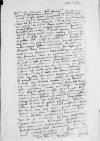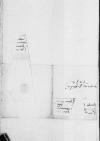Reverendissimo in Christo Patri et Domino, domino ⌊Ioanni Dantisco⌋ episcopo Culmensi etc., domino tamquam patri honorandissimo
Reverendissime in Christo Pater, Domine honorandissime.
Praemissa humili oblatione obsequiorum meorum.
Vix scribere possum, quantis molestiis fuerim exagitatus in procurandis iis munitionibus, pro quibus me ⌊caesarea maiestas⌋ transmisit, tertio enim fui ⌊Ulmae⌋ et ⌊Augustae⌋ obtinuique longe maximam vim pulveris bombardici supra omnem exspectationem et quae sufficiat cuivis magnae expeditioni. Proinde, ut de rebus nostris intelligas, omnia pacata
sunt praeter opinionem. Iamque transiit Saturni malitia, operatus est enim id, quod dixi de incendio castrorum, si meministi, et quaedam alia.
⌊Caesar⌋ iampridem solvit ⌊Ratisbona⌋ atque illum nunc puto ⌊Lincii⌋ agere. Superest ⌊Gabriel Martinengius⌋ praefectus munitionum ⌊Ratisbonae⌋, ad quem nunc recta proficiscor. Fui nuper apud ⌊eum⌋, ad quem ⌊⌋ de data undecimae Augusti, qui istic famulum habuit pro equis emendis. ⌊Qui⌋ ⌊⌋, si quando me ⌊caesar⌋ dimitteret. Dixit futurum me ⌊illi⌋ gratissimum et maximam condicionem et ea certitudine, qua peterem, habiturum, et multa in hanc rem. Ego ad eum non fueram profectus, nisi consulto prius ⌊Barensi⌋[2] et ⌊Granvellano⌋. Suspicabar enim aliquid tale, cum viderem tot missis nuntiis eoque studio illum petere adventum ad se meum. Et quicquid respondi, fuit autem id modestum et neque renuentis in totum, neque assentientis, tantum gratias egi de oblatione neque mihi nunc id integrum fore duxi finito bello Turcico ipsum tempus edocturum multa, omne id praefatis et ⌊Valdesio⌋ retuli. Neque id infeliciter cessit, sed laudarunt. Habent etiam, quod non vituperent. Ego enim cf. Curt. L.IV, 11.14 Ingrata oratio regi fuit; itaque ut finem dicendi fecit, “Et ego” inquit “pecuniam quam gloriam mallem, si Parmenion essem: nunc Alexander de paupertate securus sum et me non mercatorem memini esse sed regem. Nihil quidem habeo venale, sed fortunam meam utique non vendo.”; ASD IV-4 IV 310-313 Darius obtulit has condiciones Alexandro, ut ab ipso acciperet talentorum decem milia et insuper Asiam secum ex aequo partiretur. Id quum recusaret Alexander, “Ego” inquit Parmenio “accepissem, si Alexander essem”. “Et ego”, inquit Alexander, “si Parmenio essem”. ; Plut. Paral. Alexander 29.4; Plut. Mor. 180B (11); Plut. Apoph. 43.1 ⌊si Cornelius non essemcf. Curt. L.IV, 11.14 Ingrata oratio regi fuit; itaque ut finem dicendi fecit, “Et ego” inquit “pecuniam quam gloriam mallem, si Parmenion essem: nunc Alexander de paupertate securus sum et me non mercatorem memini esse sed regem. Nihil quidem habeo venale, sed fortunam meam utique non vendo.”; ASD IV-4 IV 310-313 Darius obtulit has condiciones Alexandro, ut ab ipso acciperet talentorum decem milia et insuper Asiam secum ex aequo partiretur. Id quum recusaret Alexander, “Ego” inquit Parmenio “accepissem, si Alexander essem”. “Et ego”, inquit Alexander, “si Parmenio essem”. ; Plut. Paral. Alexander 29.4; Plut. Mor. 180B (11); Plut. Apoph. 43.1 ⌋, invenirem viam ad fortunam citra calumniam, quae vere posset impingi, et possem non incommodus esse. Rogo, perpende singula et amico homini perscribe, quid sentias.
Rerum novarum hic nihil est, nam omnes pendemus a ⌊Turcis⌋. Reor autem omnino ante XIIII Octobris, quo tempore retrogradari Saturnus incipit, finem nos habituros, qui neutri parti satis erit commodus.
Latores praesentium viri sunt boni et docti. Eos Dominationi Vestrae commendo. Ex ⌊Lincio⌋ scribam latius. Interim bene vale, Domine et Pater. Ego proficiscor ad proelium optimo animo et bene armatus.
cf. Vulg. 1Sm 3.18.3 Dominus est. Quod bonum est in oculis suis, faciat ⌊ Deus faciat, quod bonum est in oculis suiscf. Vulg. 1Sm 3.18.3 Dominus est. Quod bonum est in oculis suis, faciat ⌋. Commendat sese plurimum Dominationi Vestrae dominus ⌊Hieronymus Saller⌋.
[2 ] From 1530 the Archbishop of Bari was ⌊Girolamo Grimaldi⌋, but he was not connected with the imperial court, while Merino, who was called Barensis in Dantiscus’ previous correspondence (e.g. in the address of ⌊⌋, i.e. quite a long after Merino’s promotion to the bishopric of Jaén), was still an active councillor to the Emperor and was at that time staying at the court (cf. ⌊⌋, p. 91)

